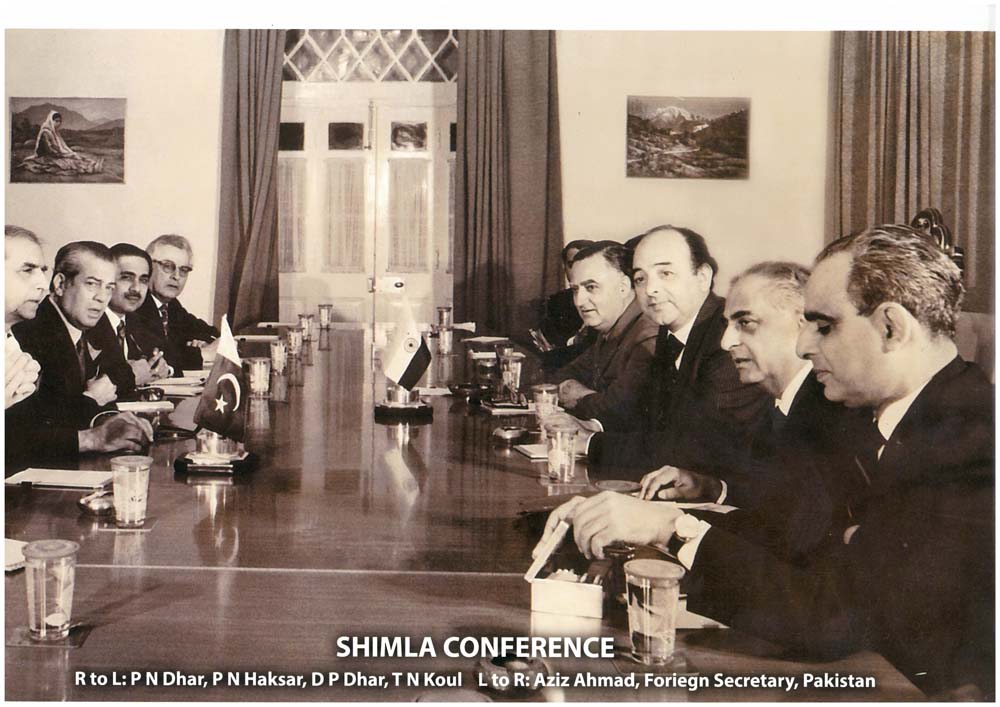
In August 1971, DP Dhar had been recalled from his ambassadorial assignment in Moscow and appointed Chairman of the Policy Planning Committee in the Ministry of External Affairs, with the specific mandate to manage India’s involvement in the liberation of Bangladesh.
Following the Indo-Pakistan War in December 1971, D.P. Dhar became India’s chief negotiator in all talks with Pakistan.
Pre-Simla negotiations in Murree
On 26 April 1972, D.P. Dhar led a seventeen-member Indian delegation as a special envoy to Pakistan to negotiate an agenda for talks to be held between Prime Minister Indira Gandhi and President Zulfikar Ali Bhutto in Simla later that summer. Dhar came with a genuine intention to lay the groundwork for ‘a durable peace’. As he addressed the Pakistani press at the Rawalpindi airport, he emphasized this intent. He ended the brief by asking the press to join him in reading the first stanza of the poem ‘Dua’ by one of his favourite poets, Faiz Ahmed Faiz:
“Aaiye haath uThāeñ ham bhī,
ham jinheñ rasm-e-duā yaad nahīñ
ham jinheñ soz-e-mohabbat ke sivā
koī but kaī ḳhudā yaad nahī”
(We, who have forgotten how to pray,
we, who have forgotten our idols, our gods,
we, who only remember our sears of love—
let’s come together, let’s too lift our hands to pray)
Dhar met with his Pakistani counterpart, Foreign Minister Aziz Ahmed, in the hill station of Murree. A New York Times report of the same day states:
“The delegates, assembled at this wooded hill station 40 miles north of Rawalpindi on the road to Kashmir, met for two and a half hours in the morning, chatted informally at cocktails and lunch, and then met more for two hours more late in the afternoon. Reliable sources said the preparatory talks could be concluded by late tomorrow or early Friday.
The chief negotiators—Durga Prasad Dhar for India and Aziz Ahmed for Pakistan—made no public comment but issued a joint communiqué. It said the talks were cordial and added:
“There was unanimity of views between the two sides on the need for the establishment of a durable peace on the subcontinent. In the course of their discussions, the two sides sought to identify the issues which would come up for consideration when the President of Pakistan and the Prime Minister of India meet.” (View The New York Times report)
On 27 April, the delegates met again in the afternoon for three and a half hours, aiming to finalise the agenda. The partition of Pakistan and the war with India had left President Bhutto in a precarious position.
“D. P. Dhar, the chief Indian negotiator, reportedly stressed yesterday that India was well aware of Mr. Bhutto’s domestic troubles and did not want to aggravate them. Mr. Dhar, according to delegation sources, expressed the view it was in India’s interest to have a stable, healthy and non belligerent Pakistan under civilian control on her western, flank. Indian officials are said to believe that domestic upheavals would most likely result in yet another take‐over by the Pakistani military, which would be prone to renew a hostile policy.” (Read this New York Times report here).
The talks did not proceed as planned, and the two sides made little headway in those two days. To help smooth things over, President Bhutto invited D.P. Dhar to meet with him in Rawalpindi. On 28 April, Dhar met Bhutto for 75 minutes to discuss the upcoming talks. Dhar later commented that the discussion was “fruitful and constructive” and held “in spirit of understanding and frankness.” (Source)
Much to the confusion of the press, Dhar, who is an avid reader, spent the few hours he had outside negotiations book shopping. The press found it hard to understand why he wasn’t sightseeing. But anyone who knew D.P. Dhar understood that his curiosity for what lay on the bookshelves of Rawalpindi far outweighed any desire to play the tourist.
The Simla Agreement


D.P. Dhar’s trip to Murree laid the groundwork for talks between in India and Pakistan. While much of the agenda was still under debate, the two countries agreed on enough points to move forward.
On June 28, 1972, President Bhutto, Aziz Ahmed and the Pakistani delegation arrived in Simla for what would later come to be known as the historic Simla Agreement. Once again, Dhar was the chief negotiator for the Indian side. Along with Mrs. Gandhi, he led the discussions over the next few days.
Unfortunately, while at the talks on 30 June, he suffered a mild heart attack. He was immediately hospitalised and the talks remained in deadlock. P.N. Haksar stepped in to fill his role and presided over the final negotiations on Kashmir, a point of the talks that Dhar had been particularly keen on. Dhar eventually missed the final negotiations and the signing of the agreement that he engineered.
On July 2, 1972 India and Pakistan signed The Simla Agreement. The agreement aimed to “put an end to the conflict and confrontation that have hitherto marred their relations”. It paved the way for bilateralism in Indo-Pak relations and the diplomatic recognition of Bangladesh by Pakistan.